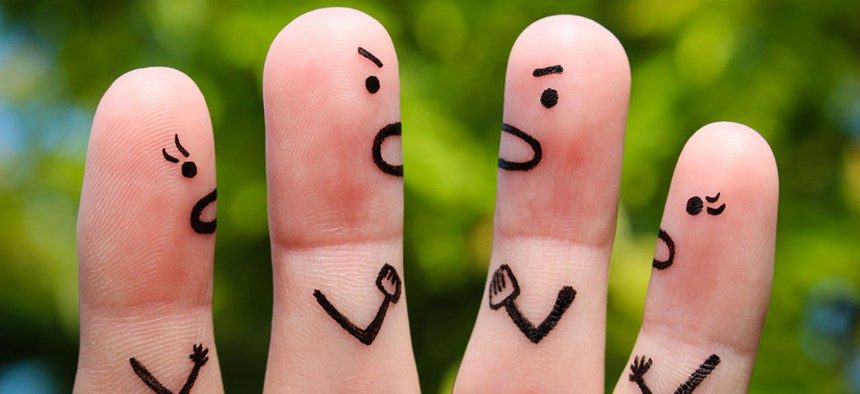
Victoria 1/Shutterstock.com
The Silent Killer of Workplace Happiness, Productivity, and Health is a Lack of Basic Civility
Those who unleash on others, belittle subordinates or undermine colleagues may leave a wake and create ripple effects.
More than ever before, people are feeling disrespected at work. Employees, like some at Uber, feel they’re working in a toxic culture with insensitive managers. Others complain about being treated disrespectfully based on gender, race, or religion. Some employees receive rude, stinging emails like those emails from The Walking Dead’s Frank Darabont.
What are the costs of employees feeling disrespected? Over the past 20 years, I have researched this question. I’ve polled tens of thousands of workers worldwide about how they’re treated at work. Nearly half of those surveyed in 1998 reported they were treated rudely at least once a month, which rose to 55% in 2011 and 62% in 2016. Though the toll is sometimes hidden, the costs of incivility are tremendous.
Of the nearly 800 managers and employees across 17 industries Christine Pearson of the Thunderbird School of Global Management and I polled, those who didn’t feel respected performed worse. Forty-seven percent of those who were treated poorly intentionally decreased the time spent at work, and 38% said they deliberately decreased the quality of their work. Sixty-six percent reported their performance declined and 78% said their commitment to the organization had declined.
Many of these—and other—costs go undetected. Stress stemming from incivility can silently kill productivity—and people. Those who unleash on others, belittle subordinates or undermine colleagues may leave a wake and create ripple effects. Eighty percent lost work time worrying about an uncivil incident, and 63% lost work time in their effort to avoid the offender. Incivility can deplete immune systems, causing cardiovascular disease, cancer, diabetes, and ulcers. Research also shows that working in a group where incivility is present affects people’s mental health, even after accounting for general stress and the incivility an individual personally experienced. You don’t have to be the targeted population, or the employee who gets ripped publicly to be negatively affected. You may get pulled off track thinking about the incident, how you should respond, or whether you’re in the line of fire.
Whether people suffer from mental or physical health effects or not, many employees leave the organization. In our survey, of those treated poorly 12% said they had left their job because of the uncivil treatment. Yet those who quit in response to incivility typically don’t tell their employers why.
Even if people who experience or witness incivility want to perform well, they can’t. In my experiments with Amir Erez we watched performance plummet after incivility occurred. Just witnessing incivility caused outcomes to decrease by nearly half. Witnesses’ of incivility weren’t nearly as creative on brainstorming tasks.
Incivility kills helpfulness and collaboration. In experiments, I’ve found that when employees are exposed to rudeness, they are three times less likely to help others and their willingness to share drops by more than half.
Incivility’s toll on customer relationships can be staggering. My research with Valerie Folkes and Debbie MacInnis at the University of Southern California shows that many consumers are less likely to buy from a company they perceive as uncivil, whether the rudeness is directed at them or other employees. Witnessing one quick negative interaction leads to generalizations about other employees, the organization, and even the brand. In the wake of employee complaints of incivility, harassment, and a toxic environment at Uber, for example, customers have shared that they’ve turned to their competitors. An organization’s reputation for how they treat employees strongly affects customer support and loyalty.
Leaders set the tone. A study of cross-functional product teamsrevealed that when leaders treated members of their team well, and fairly, the team members were more productive individually and as a team. They also were more likely to go above and beyond their job requirements. It all starts at the top. In my study of over twenty thousand employees around the world, those who felt respected by their leader reported 92% greater focus and prioritization, 55% more engagement, 56% better health and well-being, 1.72 times more trust and safety, and 89% greater enjoyment and satisfaction with their jobs. Those that feel respected by their leaders were also 1.1 times more likely to stay with their organizations than those that didn’t.
If you want to craft more civil cultures, weed out toxic people before they join your organization. Interview for civility, using structured interviews with behavioral questions. Check references thoroughly, but also go beyond provided references, chasing down leads and hunches.
Be explicit about your organization’s values. Make civility a part of your mission statement, posting it somewhere visible. Engage your team in a dialogue about what your norms should be. Then make it clear to your employees that they need to hold their managers and colleagues accountable for living up to your norms of civility.
One surefire way to signal how much you value civility is to measure and reward it during performance reviews. Find ways to publicly reinforce civility through awards and recognition.
Finally, leaders need to correct bad behavior swiftly. Danny Meyer, owner of twenty-seven restaurants in New York City, preaches civility and tolerates nothing less. If bad behavior from an employee at any level isn’t corrected quickly, they’re gone. Meyer is convinced that customers can taste incivility. Even exceptional chefs don’t last in Meyer’s restaurants if they’re disrespectful to other employees.
Incivility is too costly to ignore. Focus on providing a culture where people feel respected—it pays.
Dr. Christine Porath is the author of Mastering Civility: A Manifesto for the Workplace. Follow her at her website.






